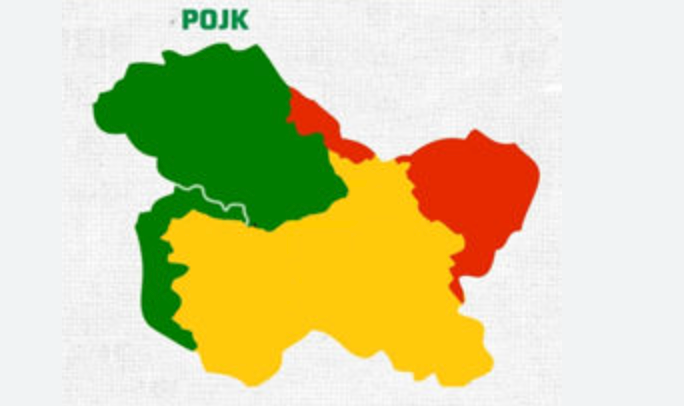India's Renewed Stance on Pakistan-occupied Jammu and Kashmir (POJK): A Legal and Geopolitical Analysis

Author: Dr. Vishal Sharma
+91 98689 11163
Assistant Professor at Bennett University, Greater Noida, UP
Since 1947 India's position on Pakistan-occupied Jammu and Kashmir (POJK), Gilgit and Baltistan has been consistent. India has based it’s position on well-established historical and legal documents. This Indian stance has been recently reaffirmed by the speeches of key Indian leaders, such as External Affairs Minister Dr. S. Jaishankar and Defence Minister Rajnath Singh. Their declarations, made around the 31st anniversary of India's 1994 parliamentary resolution concerning POJK, Gilgit and Baltistan underscore a reaffirmedcommitment to this issue.
Historical and Legal Foundations
The origins of the illegal occupation of POJK, Gilgit and Baltistan trace back to the events of 1947 when in the guise of tribal militias Pakistani army invaded Jammu and Kashmir, resulting in the first Indo-Pakistani war. In 1947 Maharaja Hari Singh was willing to merge the erstwhile princely state of Jammu and Kashmir with the dominion of India. But Pt. Jawaharlal Nehru imposed two preconditions for accepting the merger: first Sheikh Abdullah should be appointed as prime minster of the state; second, the Maharaja should abdicate the throne and go to exile in Bombay. Due to this adamant attitude of Pt. Nehru the merger of Jammu and Kashmir was delayed and in order to exploit this situation Pakistan attacked the state. Amidst the ensuing turmoil, Nehru had to accept the merger when Maharaja Hari Singh, the sovereign of Jammu and Kashmir, signed the Instrument of Accession, thereby integrating his dominion with the newly independent India. But, a portion of the territory remained under the illegal occupation of Pakistan because India had to ceasefire because Nehru had unilaterally gone to the United Nations.
Indian Parliament, in the aftermath of exodus of Hindus from Kashmir, in a resolution dated February 22, 1994, unanimously reiterated that POJK is an integral part of India, asserting that Pakistan must vacate the territories it has occupied through aggression.
Global Political Dynamics and Responses
The current international political climate, characterized by a resurgence of territorial claims, by Russia, China and now also by United States of America, may potentially be more accommodating of India’s historical and legal rights over POJK. Unlike territorial expansions instigated by military aggression seen in other parts of the world, India's claim is anchored in both legality and a historic treaty.
Pakistan’s Declining Geopolitical Leverage
On the other hand, Pakistan's international standing has been compromised over the past decade, particularly with its inclusion on the Financial Action Task Force (FATF) grey list, which has severely hampered its financial capabilities. Concurrently, the reduction in U.S. aid post-Afghanistan conflict has aggravated Pakistan's economic troubles. In contrast, India has strengthened its economic and military prowess, enhancing its diplomatic weight and strategic partnerships on the global stage.
India’s Strategic and Military Preparedness
India has been systematically strengthening its military capabilities, reflecting a readiness to address any potential conflict that may arise from its claim. This military preparedness, however, is complemented by a strategic approach that considers potential diplomatic complications, particularly with regard to China, given its strategic investments in Pakistan through the China-Pakistan Economic Corridor (CPEC).
Challenges in Reintegration
The reintegration of POJK poses some other significant challenges as well. Governed by Pakistan for over seventy years, the region has been stuffed with anti-India terrorist groups.Any reintegration strategy must, therefore, encompass a multidimensional approach, addressing security related issues, along with economic, and socio-cultural issues to ensure a seamless transition.
Prospective Strategies and Outcomes
As the Modi government has entered its third term, the strategy towards the reintegration of POJK has emerged as a pivotal element of India's national policy. Whether through diplomatic engagement, economic pressure, or military strategy, this initiative requires a carefully calibrated approach to mitigate international reactions and facilitate successful integration.
Conclusion
India stands at a critical juncture with the potential to decisively act on reclaiming POJK or maintaining the status quo. Such a decision will significantly influence the regional dynamics and India's assertion as a global power. As domestic support for reclaiming POJK grows and the international landscape appears conducive, India may be poised to act on its longstanding territorial claim. The chosen path will undoubtedly shape India's future geopolitical landscape and its role in international affairs.
